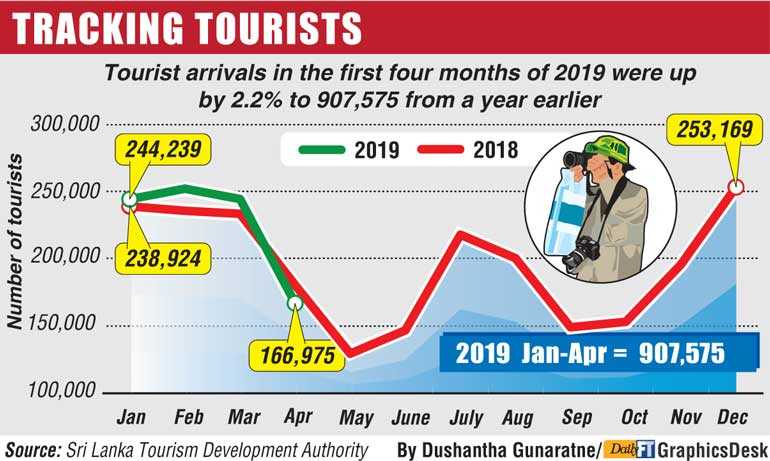Monday Feb 16, 2026
Monday Feb 16, 2026
Friday, 24 May 2019 00:00 - - {{hitsCtrl.values.hits}}

By Nisthar Cassim
The terror-struck tourism industry is now faced with a fresh dilemma, as the much-lauded reduction of Value Added Tax (VAT) from 15% to 5% would in fact give more problems than relief. On the face of it, though the reduction of VAT from 15% to 5% reflects a 66.6% saving, it renders the hotels, restaurants and others unable to claim an input VAT paid on purchases, imports and other supplies. The current VAT Act restricts the claim of input credit if output VAT is at 5%.
For example, previously, if the room rate is $ 100, the VAT-inclusive cost at 15% VAT will be $ 115. If the same hotel buys or imports goods worth $ 100, the VAT payable is 15%, incurring a total cost of $ 115. However, with VAT chargeable by hotels at 5%, using the same example, the room rate will be priced at $ 105, but purchases will be at 15% VAT and costs remain unchanged.
As per the law, those with 5% output VAT cannot claim for input-output VAT calculation therefore end price for the consumer will increase by 3-4% and net benefit for the customer/guest which should have been 10% will be reduced to 5%.
Tourist Hotels Association of Sri Lanka (THASL) Chairman Sanath Ukwatte, when contacted by the Daily FT, confirmed that the industry was in a quandary, as the relief of 5% VAT on tourism industry has created more complications, without any material benefit to the Industry.
“At a time when the Industry needed all the support from the Government to survive, although the 5% VAT looks like a reduction from the present 15% VAT, the restriction via the Act doesn’t offer a real benefit,” he said. “This is mainly due to the third proviso to Section 22 (3) of the VAT Act, which prohibits persons charging VAT at the rate of 5% to claim an input VAT paid to suppliers and the Director General of Customs for imports,” he added.
“Depending on the quantum or the availability of input VAT, most hotels and other tourism-related businesses may find this new structure detrimental. To make it more transparent and fair, THASL has decided to request the Government to amend the third proviso to Section 22 (3) of the VAT Act, to permit claiming of 15% of input VAT,” Ukwatte revealed.
Other industry experts said the Government could look at reducing the preferential yet temporary preferential VAT rate for tourism to 6%. “This would circumvent the current restriction in the VAT Act, which restricts the claim of input credit if output VAT is at 5%,” they said, adding, “This would enable the total difference in VAT of 9% to be passed on to the tourist.” Another suggestion is to reduce the VAT rate to below 5% i.e. 4%.
The third proviso to Section 22(3) of the VAT Act reads as: “Provided further, that any person who accounts for the output tax at the rate of five per centum shall not be entitled to deduct any input tax in relation to such supply other than in the case of a motor vehicle used for purposes of transportation of machinery for production.”
The experts also suggested that the Government could afford the tourism industry full input credits without restriction, where there is significant capital investment.
“Any excess input credits over output tax in a given taxable period – which could arise due to capital investment in refurbishing or installing security systems – could be considered as tax credits available for set off against any tax payable to the Commissioner General of Inland Revenue, including but not limited to VAT, NBT, Income Tax, WHT, PAYE etc. This should be available for set-off against any tax payable from the date of filing the VAT returns in which the excess credit arose,” they pointed out.
“This will provide a cash flow relief to the industry, and does not result in any tax leakage to the Government,” the experts added.
“If not, reducing VAT to a lower rate to allow for a price reduction to the consumer (tourist) would not have the full intended result, since limiting input credits or having to fund of VAT refunds for a period of time would have the effect of increasing cost to the industry,” it was stressed.
Experts also noted that the concessionary rate of VAT should be afforded to the total supplies by any institution licensed under the Tourism Act, No. 38 of 2005 other than which is governed under Sec 7 (Zero Rating) or 8 (Exemption) of the VAT Act. It should also include domestic air travel.
Effective date as per Inland Revenue notice is 22 May 2019, whereas the experts suggest relief period to be covered to be from 01/06/2019 to 30/06/2020 (13 months).